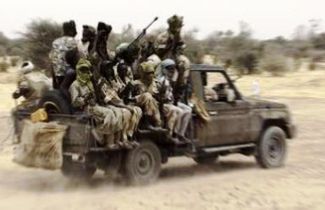JEM rebels slam Arab support to Sudan’s Bashir, pledge more action
March 31, 2009 (LONDON) — The Justice and Equality Movement (JEM) slammed today the strong Arab support to the ICC-wanted Sudanese president and pledged more action to defend the rights of Darfur people.
 The 21st Arab Summit held in the Qatari capital issued on Monday a strong statement on the International Criminal Court’s decision against President Omer Al-Bashir who attended the annual meeting despite the arrest warrant.
The 21st Arab Summit held in the Qatari capital issued on Monday a strong statement on the International Criminal Court’s decision against President Omer Al-Bashir who attended the annual meeting despite the arrest warrant.
Bashir also before the summit paid a visit to two Arab countries, Egypt and Libya, defying the ICC.
In response, JEM rebels denounced the support of the Arab League countries particularly the government of Qatar, which sponsors a peace process to end the six-year conflict in Darfur. “Qatar has tarnished its credibility by the reception of Al-Bashir,” said Ahmed Hussein Adam, JEM’s spokesperson.
Adam further said the Qatari officials “went too far and so we are assessing the whole process and will take decisions allowing us to better defend the interests of Darfur people.” He further described the warm welcome for Bashir in Doha and his designation as the concluding speaker of the summit as “an insult for the people of Darfur and peace lovers.”
“And now they should not be surprised of any position that we adopt towards the peace process,” he added.
JEM has already suspended its participation in the Doha peace process after the expulsion of 13 international aid groups from Darfur early this month. The rebel movement asked the UN-AU mediator and Qatar to press Sudan to abide by its commitments made in the Doha goodwill agreement signed on February 17. It says Sudan violated by expelling the aid groups.
The Arab League, most of whose members are not state parties to the Rome Statute, used the meeting to denounce the ICC decision against Bashir and called on its members not to cooperate with the court. “We stress our solidarity with Sudan and our rejection of the ICC decision against President Omer Al-Beshir,” Arab League chief Amr Moussa said, reading the Doha declaration.
Adam regretted that the Arab leaders didn’t change their bad perception for the cause of Darfuri people. “They left the main issue and their major concern became how to save the oppressor (Al-Bashir),” he underscored.
He also accused the Arab leaders of having a double standard and misleading words in their final communiqué.
The Arab leaders distinguished between war crimes in Darfur and Gaza. The responsibility in Darfur is shared by government and rebels while Israel bears sole responsibility for crimes committed during its last operation in Gaza, said the Arab League chief Amr Mussa.
The rebel official said JEM understood the lesson and will focus its efforts in the future to fight for the rights of Darfur’s people; and it will stage a fierce confrontation with the Sudanese government because the international community has failed prevent Bashir’s participation in the Arab summit and also failed to convince Khartoum to reverse on the expulsion of the aid groups from Darfur.
“We will not let Al-Bashir to continue the massacres as the world watches,” he warned.
However, a Sudanese presidential advisor, Mustafa Osman Ismail, told the Qatari news agency that JEM would change its position and resume the suspended peace process when it realizes the impact of the Arab support and the ineffectiveness of the ICC arrest warrant.
JEM’s spokesperson also said he was frustrated by the statement made by the joint mediator, Djibril Bassolé before the UN Security Council on March 26. He said Bassolé’s focus on the ICC decision as main hindrance for the peace process is not correct because the issue of justice should not be linked to the political process.
Adam stressed that Khartoum is to be blamed because the eviction of the 13 aid groups from Darfur is a clear violation of the goodwill agreement that Bassolé mediated. “Bassolé should have explained that the regime has no intention to reach a negotiated solution but plans to end the conflict militarily.”
The Arab League backing to Sudan’s President could boost Sudan’s willingness to challenge the West on its rejection for any cooperation with the ICC. Also, it could undermine any role for the Arab countries in the resolution of the conflict.
The Qatari sponsorship was seen as golden opportunity to challenge the criticisms addressed to the Arab failure to press Khartoum to end atrocities committed against Darfuri.
(ST)
